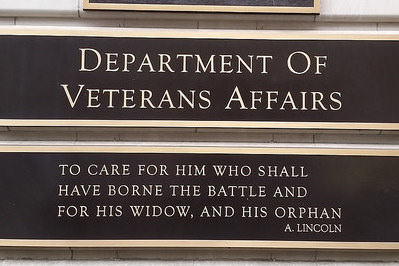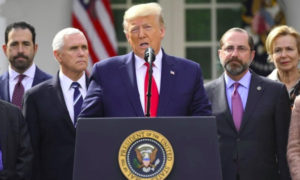Truthdiggers of the Week: Whistleblowers in the Department of Veterans Affairs
A new leak about shoddy treatment of ailing veterans is just the latest disclosure to cast shadows over the VA. JeffOnWire / CC BY 2.0
JeffOnWire / CC BY 2.0
Internal memos leaked by Veterans Affairs employees over the years have shown that dishonest bookkeeping encouraged by department managers has resulted in the widespread denial of medical care to combat veterans.
This month, an agency document — leaked by staffer Scott Davis — showed that more than 35,000 veterans had been denied care because of an “error” in the department’s computer system. Nearly half of these veterans have waited more than five years for coverage, and one document indicated that nearly one-third of those who had been waiting have died.
The VA’s problems and the allegations of mismanagement against it are not new. There have been a number of revelations that cast the organization in a bad light. A former doctor at a VA facility in Arizona said last year that the delays related to rigged bookkeeping may have contributed to the deaths of 40 patients.
Davis, a program specialist at the Health Eligibility Center (HEC) in Atlanta, where eligibility claims are processed for VA hospitals nationwide, is one of four VA employees from across the country who told the House Committee on Veterans Affairs in July 2014 that whistleblowers who accused the department of mismanagement, waste and excessive patient wait times were targeted and punished by their superiors. Davis said his employment records were altered and he was placed on administrative leave after his manager learned of his complaints.
“VA leadership has repeatedly failed to respond to concerns raised by whistleblowers about patient care at VA,” Davis said in prepared testimony. “Despite the best efforts of truly committed employees at HEC and the Veterans Health Administration, who have risked their careers to stand up for veterans, management at all levels ignored or retaliated against them for exposing the truth.”
Some of the VA’s dirty tricks were detailed in a 2010 memo by William Schoenhard, then-deputy undersecretary for health administrative operations at the VA. The techniques included pretending that patients had canceled appointments that in fact had been canceled by the clinic, using paper records rather than more easily monitored electronic ones, and hiding the difference between patients’ desired appointment dates and the dates they were assigned by simply entering the wrong date or no date at all, or by entering the earliest available date as a patient’s desired date.
The memo relates that some clerks look inside the electronic scheduling system to determine which dates are actually available before entering the “desired date” into the system: “[T]he clerk [finds] the availability of future appointments. Once a date/time is found, the clerk exits the system and then starts over using the identified date/time as the Desired Date.”
Additionally, Schoenhard said that officials had come up with new techniques for gaming the system in the two years between the study of the techniques in 2008 and the publication of the memo in 2010.
Schoenhard published a second memo regarding additional tweaks to the scheduling process in 2013 after the Government Accountability Office spotlighted continuing problems with patient wait times. Immediately after the memo’s release, the number of appointments scheduled by a Fort Collins, Colo., outpatient clinic within 14 days of the patients’ desired dates shot up dramatically. (Fourteen days is the VA’s target variance between requested dates and appointments.)
When investigators asked employees why the change had occurred, the employees said “they were instructed by Business office staff to access the appointment schedule, review it for capacity, inform the Veteran of schedule availability, and then enter the Desired Date as the patient appointment date.” The employees explained that appointments were sometimes unavailable for as long as six to eight weeks, but “By entering the Desired Date as the appointment date, the wait time … appears to be zero days.”
An email sent to the Fort Collins clinic by its superior office in Cheyenne, Wyo., included instructions from coordinators for manipulating the desired date. “Yes, it is gaming the system a bit,” the email read. “But you have to know the rules of the game you are playing.”
In June 2014, VA Acting Secretary Sloan Gibson sent a message to all VA employees saying that the administration “must protect whistleblowers” and that intimidation or retaliation against any employee who identifies a problem or reports a violation is “absolutely unacceptable.” This and other public pledges of protection came as the Office of Special Counsel (OSC) — established to protect federal employees from reprisal for whistleblowing — reported in a letter to President Obama that “too frequently, the VA has failed to use information from whistleblowers to identify and address systemic concerns that impact patient care” and that “as a result, veterans’ health and safety has been unnecessarily put at risk.”
An OSC news release, also from June 2014, said the office had 50 pending cases involving VA employees alleging “threats to patient health or safety” and was reviewing “approximately 60 cases of alleged retaliation against whistleblowers who reported concerns about scheduling, understaffing, and other patient care issues in VA facilities.”
The whistleblowers in the Department of Veterans Affairs, both this month and in previous years, are our Truthdiggers of the Week.
Your support matters…Independent journalism is under threat and overshadowed by heavily funded mainstream media.
You can help level the playing field. Become a member.
Your tax-deductible contribution keeps us digging beneath the headlines to give you thought-provoking, investigative reporting and analysis that unearths what's really happening- without compromise.
Give today to support our courageous, independent journalists.






You need to be a supporter to comment.
There are currently no responses to this article.
Be the first to respond.